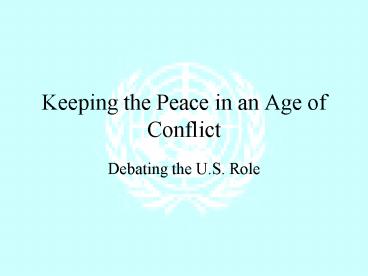Keeping the Peace in an Age of Conflict - PowerPoint PPT Presentation
1 / 15
Title:
Keeping the Peace in an Age of Conflict
Description:
Arms limitations. The League of Nations. Nothing is going to keep. This world fit to live in ... June 1945, 55 nations signed the UN charter in San Francisco. ... – PowerPoint PPT presentation
Number of Views:84
Avg rating:3.0/5.0
Title: Keeping the Peace in an Age of Conflict
1
Keeping the Peace in an Age of Conflict
- Debating the U.S. Role
2
Part 1 The International Communitys Changing
Role
3
How did President Wilson respond to the horrors
of WWI?
- Diplomatic miscalculation had triggered the
conflict. - Clear procedures for conflict resolution could
have prevented WWI. - 14 points (1918)
- Self-determination
- Freedom of seas
- Free trade
- Arms limitations
- The League of Nations
Nothing is going to keep This world fit to live
in like exposing in public every crooked thing
that is going on. --Woodrow Wilson
4
Why did America Reject a larger international
role?
- Opponents of the league argued that the new
organization would be a tool of France and
Britain. - The Senate was concerned that they would be drawn
into European conflicts. - US troops could be called upon to defend the
borders of a French colony in Africa.
5
Why did the League of Nations Fail?
- Enforcement was difficult
- No effective mechanisms to force nations to honor
the covenant. - The requirement that all League members agree to
important decisions often blocked action. - League membership was far from universal
- US didnt join
- Germany and USSR were initially excluded
- Early failures (1930s)
- League failed to stop Japanese aggressioninvasion
of Manchuria, Rape of Nanking. - Powerless in the face of Italian and German
aggression.
6
The United Nations
- Like the League of Nations, the seeds for the
creation of the UN were planted during war. - Atlantic charter
7
How was the UN organized?
- June 1945, 55 nations signed the UN charter in
San Francisco. - Common interest in maintaining global peace.
- 5 permanent members of the Security Council
- The veto system was conceived as a safety valve
that would allow the great power to disagree
without threatening the UNs existence.
8
How did the UNs founders plan to prevent war?
- Under chapter VII, the Security council has the
authority to call upon UN members to cut their
economic, transportation, communication, and
diplomatic ties with an aggressive government. - Chapter VII also empowers the Security Council to
take military action to maintain or restore
international peace and security.
9
Why did the Cold War undermine the UN?
- Initially the UN was overwhelmed by the bitter
divisions of the Cold War. - Veto systemUS-Soviet hostility often prevented
the Security Council from making decisions. - Korean War
- US led a UN forces to resist communist North
Koreas invasion of South Korea.
10
What was the role of the UN in peacekeeping
during the cold war?
- The UN was effective in dealing with disputes
related to the breakup of European empires in
Asia and Africa. - 1948Monitored a UN truce between Israel and Arab
neighbors. - Indian and Pakistani armies over Kashmir.
- Suez Crisis of 1956
- UN peacekeeping troops took their positions only
with the consent of the country or countries
involved.
11
How has the UNs role expanded since the end of
the Cold war?
- Decision making was no longer blocked by the
gridlock of the Cold War. - UN membership quadrupled
- New problems emerged
- Thinning of the ozone layer
- Spread of nuclear weapons
- AIDS
12
How have peacekeeping operations changed?
- Initially the founders of the UN saw their
primary task as resolving conflicts between
states. - Many of the conflicts raging today are fueled by
militias that ignore government authority. - Somalia
- UN forces found themselves caught in the
crossfire among rival groups that did not respect
negotiated agreements. - Bosnia
- UN troops were sent in to save lives while the
bullets were still flying. (peacemakers)
13
THE US ROLE
- Initially isolationists
- Spanish-American War
- Protect US financial interests
14
How did anti-communism shape US policy toward
international conflicts?
- CONTAINMENT
- The strategy of containing Soviet Communism
guided US involvement aboard. - Americans today are beings asked to define a new
set of values and interests for determining our
countrys involvement abroad.
15
DEFINING TERMS
- Read the handout and answer the 5 questions
proposed.





























![NOTE: To appreciate this presentation [and ensure that it is not a mess], you need Microsoft fonts: PowerPoint PPT Presentation](https://s3.amazonaws.com/images.powershow.com/6484074.th0.jpg?_=20200716105)

